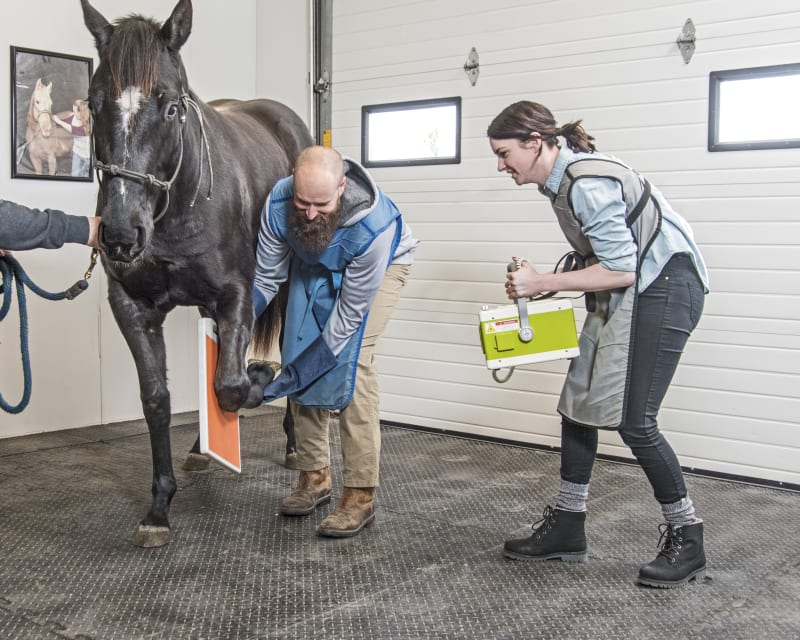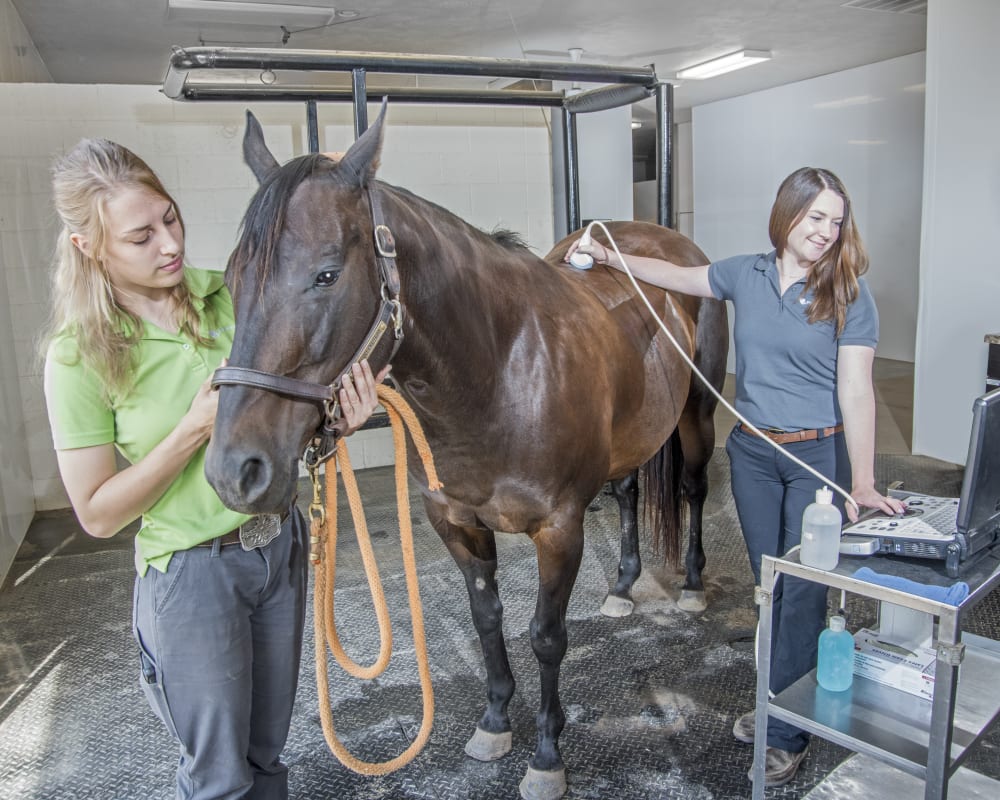Equine Imaging & Diagnostics
Capturing Valuable Information About Your Horse's Health
Early diagnosis is beneficial to treating any disease or injury. At Great Lakes Equine, we take pride in the multiple modes of diagnostic services we can provide an in-depth evaluation of your horse's health and pinpoint the source of illness or injury.
Accurate diagnosis leads to more effective treatment plans, which can improve the speed of recovery and the quality of life of your horse. Additionally, diagnostics help with early detection of diseases, allowing for prompt treatment and reducing the likelihood of complications.
Our portable diagnostic equipment allows us to provide fast and efficient diagnosis, helps us monitor your horse's progress during rehabilitation, and so much more.

Field Services for Horses Across Northeast Wisconsin
If your horse needs medical care at your farm, our veterinarians can come to your location with fully equipped trucks, stocked with the technology and tools needed to quickly and accurately diagnose your horse's condition or provide routine preventive care.

Diagnostic Services from Great Lakes Equine
With our diagnostics capabilities, we are pleased to offer advanced testing to help diagnose your horse's medical issues. Our diagnostics services include:
- Radiography (Digital X-rays)
Radiographs are often the first diagnostic imaging modality used to evaluate lameness. Digital radiography allows for greater detailed images than conventional radiography.
Digital radiography services for equine patients both in our hospital and on the farm allow us to diagnose medical issues such as fractures, laminitis, wounds, foreign objects, and penetration of joints. They can also be used for pre-purchase exams and lameness evaluations.
- Ultrasound
Ultrasound uses sound waves to produce non-invasive, painless, and radiation-free images of your horse's internal organs, tendons, and ligaments.
Unlike digital X-rays, ultrasound imaging highlights soft tissue changes such as tears in tendons or ligaments, making it a vital tool in the planning and management of injury recovery.
Ultrasound can also be used to guide technical joint injections such as the cervical spine (neck), lumbar spine (lower back), and sacroiliac joint (SI). Ultrasound is also useful in diagnosing masses or lumps. This can be used not only externally but internally as well.
- Gastroscopy
Gastroscopy describes a complete examination of the two lining tissues of the horse's stomach using a flexible video endoscope. It is performed under light sedation so your horse doesn't feel any discomfort during the procedure.
- Endoscopy
An endoscope provides your veterinarian with a clear view inside your horse's upper respiratory tract, as well as parts of the gastrointestinal, reproductive and urinary tract systems.
Being able to view these vital internal structures close up gives our veterinarians deeper insight into the health of your horse, allowing for detailed diagnosis of issues and targeted treatment options.
- Bloodwork
We can run several common and specialized blood tests to determine the health of your horse and to diagnose illness.
Some of the most common blood tests we perform on our equine patients are complete blood count (CBC), white blood count, hemoglobin and mean corpuscular hemoglobin concentration (MCHC), hematocrit, platelets, eosinophils, and blood serum profiles.
- Urinalysis
Urinalysis is a key diagnostic test that provides your vet with essential insights into the physical and chemical properties of your horse's urine.
Urinalysis is primarily used to assess the health of your animal's kidneys and urinary tract system, but this test can also help detect issues in other organ systems and is important for diagnosing metabolic diseases such as diabetes.
This is a valuable diagnostic test for both healthy and sick animals and should be included in any comprehensive evaluation of your pet's overall health.
- Fecal Egg Counts
A fecal egg count measures the number of strongyle eggs your horse is passing in each gram of their manure.
Parasites can make your horse uncomfortable, and irritable, possibly leading to more serious issues if left untreated.
Annual fecals protect your horses from a wide range of problems including colic, weight loss, and diarrhea. These tests can also protect your pasture from eggs being passed on.
Services Available In-Hospital*
Diagnostics
Reproduction
Internal Medicine
Non-surgical Colic Care
Critical Care
Surgical Services
Regenerative Therapy
24/7 Emergency Care
*Services are available in our Hortonville hospital by appointment. No appointment required for emergencies.
Rehabilitation Services*
Lameness Exams
Diagnostics
Acupuncture
Abscess Care & Treatment
Spinal Manipulation Therapy
Dentistry
Ophthalmology
Regenerative Therapy
Podiatry
*Rehabilitation services are available by appointment and will be performed on your farm.
New Patients Welcome
We are welcoming new patients at Great Lakes Equine. We can't wait to meet you and your horse. Book an appointment today.
